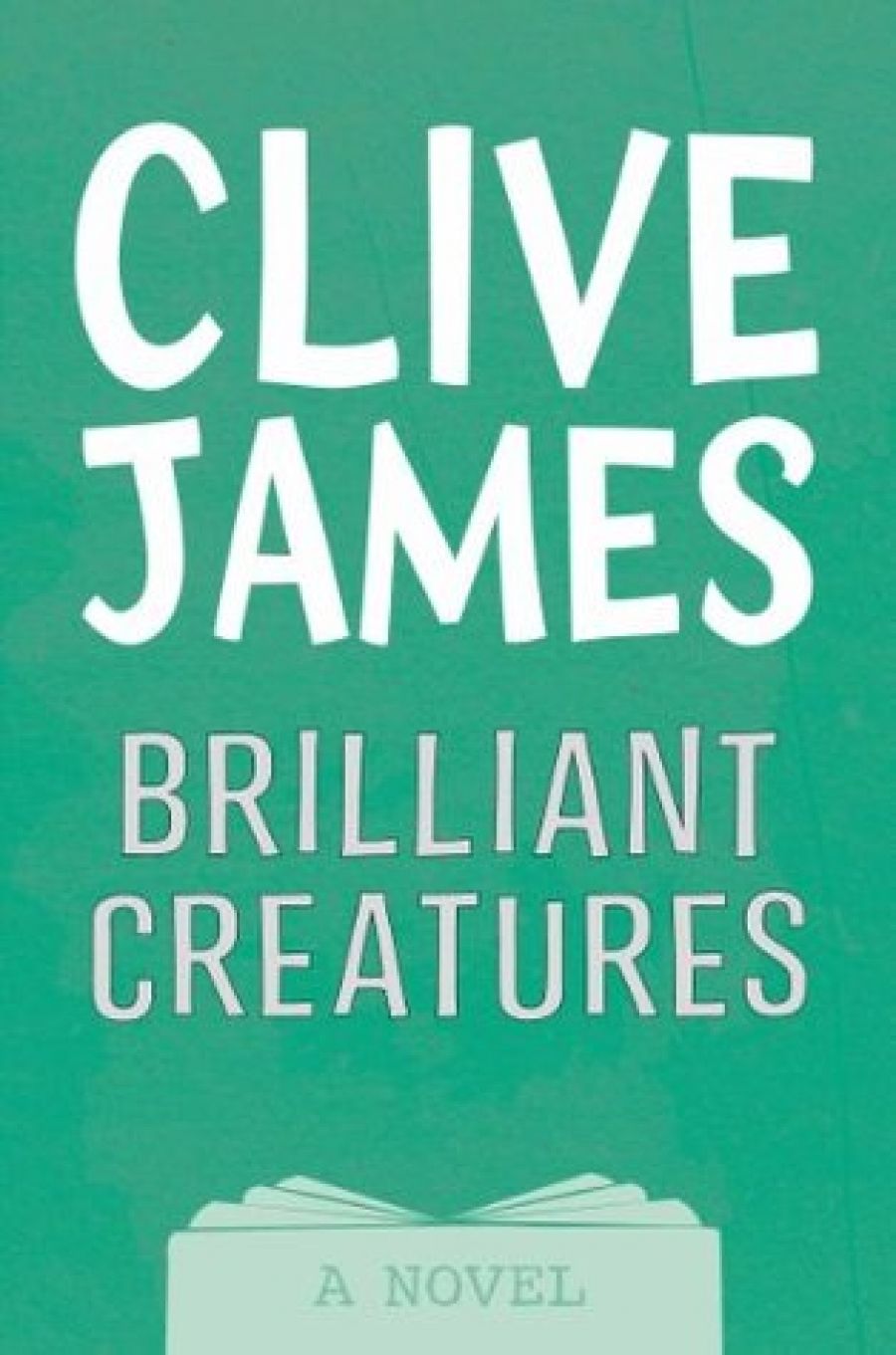
- Free Article: No
- Contents Category: Fiction
- Review Article: Yes
- Online Only: No
- Custom Highlight Text:
Brilliant Creatures is not so much a novel – a first novel, as the title page coyly points out – as it is a presentation pack. The text itself is bookended by an introduction at the front, and a set of extensive, very boring notes and index at the back. A set of notes and an index for a novel, a first novel? Yep. Clive James has heard of Nabokov and Pale Fire. He has also, as the four-page introduction makes clear, heard of his ‘illustrious ancestor Henry’: of Gide, Montaigne, Sterne, Peacock, Firbank, Trollope, Joyce, Shakespeare, and Nietzsche.
- Book 1 Title: Brilliant Creatures
- Book 1 Biblio: Jonathan Cape, $15.95 pb, 288 pp, 0224021222
Why the fuss? Well, Clive James is in two minds about his first novel. On the one hand, he recognises it for what it is: a funny, broadly drawn satire or caricature of English intellectual life. Utterly insignificant as literature, but great for passing time on an aeroplane, for instance, which makes it an entirely worthwhile achievement as far as I am concerned. (I say this from experience, incidentally: I tested it on a flight from Melbourne to Perth.) On the other hand, and despite his insistence that he is not one of those ‘many gifted, dedicated novelists pushing their medium to its limits’, there is still a sneaking element in him that wants the book to be taken as a serious contribution to contemporary fiction. This accounts for the uneasy, half-defensive, two-bob-each-way tone of the Introduction: ‘most readers will call it a night at the end of the last chapter if they get that far, but in the unlikely event of My First Novel making its way in the academic world, Peter C. Bartelski’s efforts will at least help ensure that any critical discussion, even if condemnatory, takes place at a suitably informed level.’ Hence, too, the nervous discussion of what he calls the genre of the ‘Novel Improper’ – to which he hopes Brilliant Creatures is a valuable addition.
The plot of the novel, such as it is, concerns a failing literary giant, Lancelot Windhover, now reduced to the hack-jobs of publisher’s consultant etc., married to one woman and infatuated by another, who loses both as well as everything else he has by the end of the novel, except his life. His attempt at suicide is a failure, and things begin to look improbably up for him in the last few pages. That is most of it, although it is strung out by a series of running – or rather, limping – sub-plots (leitmotifs, James-Bartelski would no doubt call them): Lancelot’s tax problems, a gang of hoods who systematically break into expensive cars and urinate on the seats before destroying the vehicles, a fancy dress party in which all the guests come dressed as figures out of opera, and so on.
The real ancestor of the novel is not any of the writers James mentions, but the early Evelyn Waugh, or perhaps Lucky Jim. James told the Australian press that he was worried someone might recognise the originals of his characters. I would not have been concerned because none of them are originals – in fact, they are barely recognisable as fellow creatures on the same planet as ourselves. Apart from Lancelot, they have names like Delilah Ball–Hunt, Dick Toole, and Samantha Copperglaze. They do things like breathe underwater, and ring up their wives and mistresses from all over the world to have deep and meaningful conversations. Most of them come complete with tags: Nicholas Crane, ‘the successful young author of novels so horrifying, that juries gave them prizes to get out of reading them’; Gillian Jackson, ‘star agony columnist and the most famously intelligent beauty of the day’; Elena Fiabesco, ‘the relatively impoverished aristocrat who managed to live like an empress through sheer improvisational ingenuity. Some merely have tags that do not include their names: ‘the most brilliant caricaturist of the day’, ‘the world’s most famous young female film star’.
Once a good comic writer gets onto a successful gag, they works it for all it is worth. Clive James is a good comic writer. He worries about each of his jokes like a dog with a bone. There is a cook whose name changes each time she is mentioned throughout the novel, so that she becomes, in turn: Mrs Hermesetas, Mrs Halitosis, Mrs Hermeneutics, Mrs Hydrostatics – you get the idea. There is a secretary who has an enormously loud voice; the possible variations on this theme are endless.
Brilliant Creatures is a good read. But behind the deftness of the witty phrase and the skilful gag, there is nothing – not even a façade. And what can one say of a novelist who thinks Australians still say (if they ever did) ‘Stone the crows’? Ah well, I suppose he still calls Australia home.


Comments powered by CComment